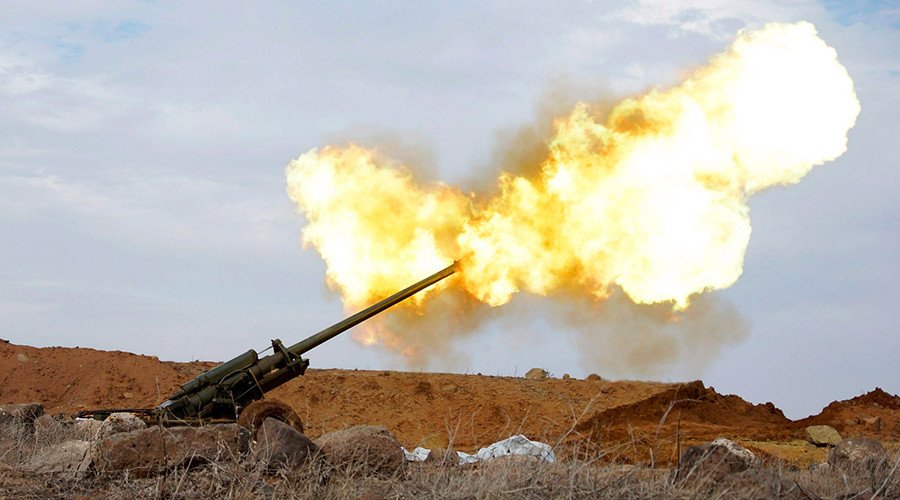
But the Western powers and their regional partners, Saudi Arabia, Turkey and Qatar in particular, are insisting – explicitly or implicitly – on their objective of ousting Assad. This premise of unlawful interference in the affairs of a sovereign state is the crux of the problem, and why the latest seeming agreement for a nationwide truce is as thin as the paper it is written on.
US Secretary of State John Kerry and Russian Foreign Minister Sergey
Lavrov announced the proposal for a cessation of hostilities following six hours of negotiations with 15 other member states belonging to the International Syria Support Group in Munich last Friday. The truce is supposed to come into effect later this week.
The truce outlined in an ISSG communique does not apply to two militant groups: Islamic State (IS, also known as ISIL/ISIL or Daesh) and the Jabhat al Nusra Front. Both are linked to Al Qaeda and are officially listed by international governments as terrorist organizations. The provision also exempts “other terror groups” but does not specify the names. This is a major loophole in the proposed truce deal which will make its application extremely problematic if not infeasible. That loophole also alludes to the foreign-backed nature of the conflict in Syria.
Following the Munich communique, the Syrian government and its Russian ally both said that their combined military operations against terror groups would continue.
President Assad vowed that his armed forces were moving ahead with their offensive, backed by Russian air power, to “retake the whole country.” He said the battle for the northern city of Aleppo – the country’s largest – was crucial to “cut off terrorist supply routes from Turkey.”
Given the delineation of terror groups in the Munich communique and in recent UN resolutions (2249 and 2254), it would appear incontestable that the Syrian government and its Russian and Iranian allies have every right to maintain the military momentum.
Yet Syria and Russia’s continued offensive around Aleppo over the weekend provoked recriminations from Western powers. Western media coverage tended to portray the continuation of military operations as a bad faith breach of the tentative truce.
Reuters news agency reported: “Russia keeps bombing despite Syria truce; Assad vows to fight on.”
Secretary Kerry expressed irritation when he said: “If the Assad regime does not live up to its responsibilities and if the Iranians and the Russians do not hold Assad to the promises that they have made... then the international community obviously is not going to sit there like fools and watch this. There will be an increase of activity to put greater pressure on them.”
BREAKING UPDATE: Damascus confirms its army targeted by Turkey shelling http://on.rt.com/74hq
Russian Prime Minister Dmitry Medvedev also addressed the Munich conference, but he warned that any ground invasion in Syria by foreign forces ran the grave risk of unleashing an all-out war.
Over the weekend, it was reported that Saudi F-16 warplanes are to begin flying out of Turkey’s NATO base at Incirlik, allegedly on combat operations against the Islamic State terror group in Syria. Turkish Foreign Minister Mevlut Cavusoglu said that a combined Saudi-Turkish ground force was ready to intervene in Syria, and there were reports of cross-border Turkish artillery shelling of Syrian Kurdish sites.
The nub of the proposed truce is that Syria and Russia are legally entitled to eradicate ISIS, Al Nusra and related groups. Strategically, too, it can be argued that the defeat of such illegally armed insurgents is a priority task in creating conditions for an end to the five-year conflict.
However, “the related terror groups” also include many other militants whom Western governments and Western media mendaciously refer to as “moderate rebels.” So, while the Syrian Arab Army and Russian fighter planes can legitimately make the case that these groups are to be targeted, Washington and its allies will deceptively allege that Moscow is attacking “moderate rebels.”
This is a risible fiction constructed by Western governments, their regional partners and the Western media. It is well documented that groups like Jaish al-Islam, Jaish al-Fateh, Ahrar al-Sham and Farouq Brigade – heavily sponsored by Saudi Arabia and Qatar – are integrated with the officially recognized Al Qaeda terrorist organizations. Even the so-called “secular” Free Syrian Army – much championed by Washington – is in league with ISIS and Al Nusra, as are the Turkmen brigades openly supported by the Turkish government.
US government-owned news outlet Voice of America described the terror-rebel connection in the following delicate way: “The Munich deal writes out any cessation of hostilities for not only the Islamic State but [al Qaeda] affiliate Jabhat al-Nusra or other groups deemed terrorists by the UN Security Council. Some of those groups, aside from IS, have been battlefield allies of other rebel factions around Aleppo.”
‘Turkey wants to stop Kurds liberating northern Syria from ISIS’ (Op-Edge) http://on.rt.com/74hd
That’s why John Kerry has been so concerned to stymie Russia’s intervention. That intervention ordered by President Vladimir Putin less than five months ago is wiping out terror assets that Washington and its allies have invested in for regime change in Syria over five years. That investment is going up in smoke, and that is also why Washington and its regional partners Turkey and Saudi Arabia are reserving a direct military contingency – in order to salvage their regime-change project.
The proposed cessation in Syria is a long shot that will miss the mark of bringing peace to the war-devastated country. Because Washington and its allies are not interested in peace. They want regime change – by hook or by crook.


















No comments:
Post a Comment